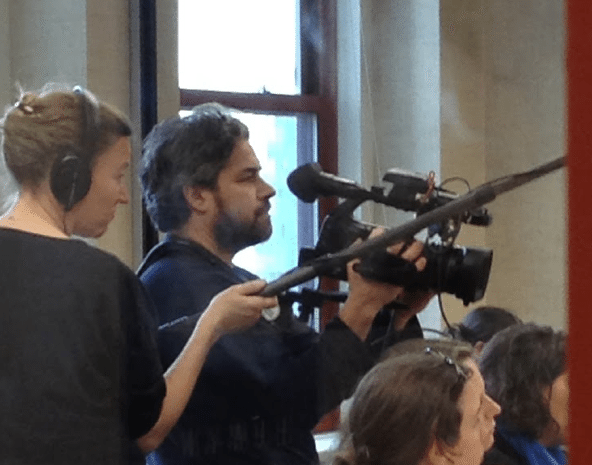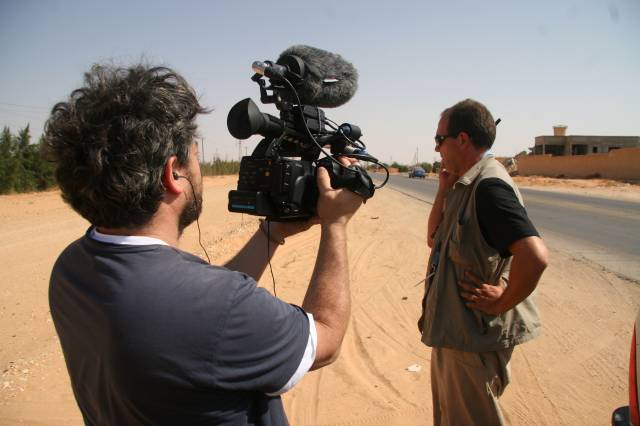

Filmmakers Ross Kauffman and Katy Chevigny have amassed two of the most impressive non-fiction filmographies in recent years. Kauffman won the Academy Award in 2004 for his harrowing Born Into Brothels about the children of prostitutes in Calcutta, while Chevigny is an Emmy-winner for Good Fortune and also directed the notable Election Day. Now, Kauffman and Chevigny have joined forces for E-TEAM, a thrilling look inside the professional and personal lives of four members of Human Rights Watch's Emergency Team, who try to solve human rights crises in places like Libya and Syria.
With thriller-like elements and sophisticated, urgent storytelling, E-TEAM is a fascinating hybrid that shows us what the future of non-fiction filmmaking should be like. We had the fortune of discussing the film with Kauffman and Chevigny who gave us insight about the editing process, defining the film's structure and the issues and themes that fascinate them.
Can you talk about how you came up with the structure and tone of the film? I felt it was very much like a thriller.
Katy: That’s a good question. We love talking about the craft of the movie and often people don’t ask about that, they just ask us about the content, so it’s nice to talk about that cause we spend a lot of time thinking about those things.
That’s usually all I want to talk about really.
Katy: We’ll have a great conversation then!
Ross: When we first met the E-TEAM, went out to dinner with them and got to know them a bit, we realized right away that these were great characters: diverse, exciting, interesting. We thought if their work was half as interesting as they were, we might have a film on our hands. As soon as we met them we thought this might work as a spy, thriller-esque kind of movie, but our job is to shoot what’s in front of us and not impose the film on them, but listen to the footage. It worked out, the footage led us into that kind of terrain.
Katy: We were also consciously thinking about fiction films, we are all great lovers and students of fiction films. We feel that there doesn’t need to be this artificial separation between documentaries and fiction films in terms of the devices at your disposal. Part of the reason fiction films are so fun to watch is because they’re designed to be watchable. Sometimes with documentaries people are just trying to explain some facts, and if that’s what you’re doing, it’s not going to be compellingly watchable. We were always thinking about the content and the investigations, but we were structuring the film always for maximum dramatic impact.
Recently we’ve seen documentaries “open up” in a way and start incorporating genre techniques to how these stories are being told. What’s your opinion on that?
Katy: Certainly there are as many different kinds of documentaries as there are fiction films. I think what you’re asking are the kinds of questions that we would like to see people keep asking, because not all documentaries are the same, some are political polemics, some are historical dramas etc. I don’t know that we were specifically trying to do a genre film per se, but we were thinking about tools to keep people glued to the screen.
Can we go even more specific? The opening scene for example, almost gave me a heart attack, and I felt there were some Kurosawa techniques, as well as mini-cliffhangers that made me think of television.
Ross: It’s funny, I can’t think of anything specific.
Katy: I would say it’s like a soup of all those that you mentioned, but specifically to E-TEAM, the opening scene for example, we wanted to give a sense of what these people do, so people would want to see more, and then we went back in time to what led you up to that point. We wanted to build up to that.
Ross: Goodfellas! (Laughs)
Katy: Or the Bourne movies, which we sometimes joked about, but really the international travel and adventure component of some of those action movies. It’s very exciting to go all over the world and see places, but instead of blowing the places up, they’re going to investigate human rights abuse, so we’re giving a little twist with that. We also want to stay true to our material, it’s like a balance between trying to do something a little bit new and different and exciting with the documentary format, while not steering so far from the material to make something that’s not true.
 Unlike fiction where you can cut and you can control your environment, documentary filmmakers never really know what’s going to happen. Can you talk about situations where you draw the line and those where you just keep on shooting?
Unlike fiction where you can cut and you can control your environment, documentary filmmakers never really know what’s going to happen. Can you talk about situations where you draw the line and those where you just keep on shooting?
Ross: Every day is different, every film is different really.
Katy: We try to abide by as much as the cinema verite conventions as possible, which is we would film what was happening, we’d never ask them to do something they weren’t doing.
Ross: We never asked them to do something again.
Katy: Occasionally we would ask them to wait two seconds so we could set up the camera, but essentially we would film whatever they were doing until the end of the day. We never know what’s going to happen in front of the camera, so we film more than a lot of people would.
Ross: There’s also ebbs and flows during the day. You turn the camera off and something amazing happens, you turn it on and nothing happens. You try to feel them out, and it’s funny, you get to the point where you feel like something might happen and if you’re lucky it happens.
Katy: We also had to plan these trips and go overseas and our producer did a great job of staying in touch with them and ask them if anything interesting was happening, and they’re remarkably modest, so they would never think anything was interesting, but there were things that might be interesting to us. So we couldn’t wait for them to ask us to come and we would let them know we were showing up. Almost inevitably, something amazing would happen in front of the camera.
Katy, your work is always focused on how democratic processes work, and Netflix is probably the most democratic distribution medium in the world. Was that on your mind when you decided to make the film?
Katy: That’s cool, that’s an interesting thought. I never thought of it that way, but I think a lot of us in the documentary business, one of the things that we struggle with is distribution and getting our film out there, that’s always hanging over our heads, what if nobody comes to see our movie? What’s great about Netflix is that they are the place where most people see documentaries now in terms of numbers. Ross and I are both old school so we love the big screen too, so we’re happy to be having this theatrical release.
Ross: Katy always said this is a big screen movie, a big war film.
Katy: Netflix have always been so open to the wide range of documentaries out there, they’re doing a great thing in getting documentaries out to as many people as possible. I never thought of it in terms of being democratic, so that’s a plus for us, to be part of that world. Also, we’re a Netflix Original, it’s a different category for nonfiction, which is something new they started this year.
Was it challenging to make a film that would work on the big screen and also in tablets, phones and other devices where people stream Netflix content?
Ross: We never thought big screen or small screen, we just sculpted the footage we had into a movie.
Katy: Also Ross and I have our own sensibilities, we like different things and that comes out as subtext in our movies, because those are the kinds of scenes we choose in the editing room. I think to be a good documentary filmmaker you need to approach the material as brand new and you can’t try to apply things that worked in your last movie. You’re lucky if anything you did in your last movie works in the next one! But usually you have to work from a clean slate. You go where the material takes you.
Ross, in your case, your films often focus on children, so watching this film I put myself both in the shoes of the E-TEAM’s children who might worry about their parents going to do dangerous work, and also in the shoes of kids who will aspire to become like these real life heroes.
Ross: It would be incredible for us if young people saw this film and were inspired by it in any shape, way or form. From clicking on our website, which will be much more interesting than watching “the housewives” of this or that place, and it would be cool if they grew up and wanted to go into activism, or do something that might help make the world a better place. Personally, it’s weird, I think I gravitate towards family, making films about families, unusual families, there’s something about that...and I hadn’t even thought about that until now.
Katy: Yeah, I’m always telling that to Ross, you’re always interested in kids and families and loss.
Ross: Unusual families that don’t fit into the mold...it’s funny cause Boy Boy Girl Girl is also about that...and so is Wait For Me...interesting.
Katy: We’ll talk to Dr. Freud about that.
E-TEAM is now in select theaters and on Netflix.